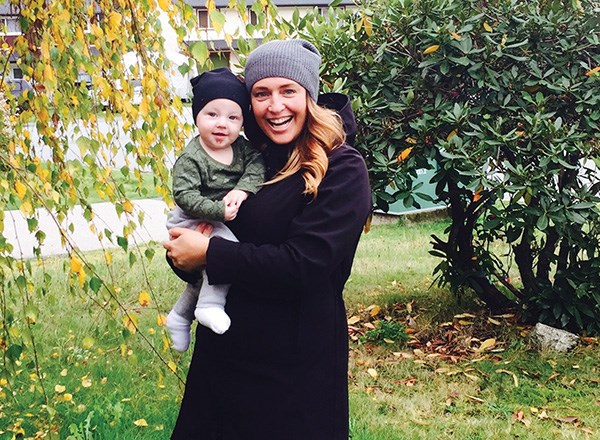The parents of a baby born with an extremely painful disease earlier this year are saying a heartfelt thank you to the Squamish community for supporting them through this taxing time.
Nash Smillie was born with hardly any skin on his feet and, after nurses bandaged him up to protect against further damage and infection, he was rushed to BC Children’s Hospital to determine what was wrong.
Nash was diagnosed with epidermolysis bullosa, or EB, a rare genetic disease that makes his skin very fragile and requires constant care.
“Once we arrived at the hospital, I made a Facebook post simply explaining what was going on and asked for prayers. Little did I know that word would travel fast throughout the community of Squamish,” says Nash’s mom, Emily Tomlinson.
“Within hours we had received countless messages from hundreds of people offering their love, support and prayers. The outpouring of love from the community was completely overwhelming.”
Her sister soon set up a GoFundMe webpage that explained the high cost of having a child with EB, which resulted in financial support and other forms of generosity from Squamish residents such as homemade meals and baked good delivered to their door and gift certificates from local businesses to help cover the cost of medical supplies.
“My husband, whose name is Kevin Smillie, and I would like to express our sincerest gratitude and thank you to everyone who has been a part of Nash’s journey,” said Tomlinson. “We are proud to be a part of Squamish – a town that bands together when one of their own is in need.”
Oct. 25 to 31 marks the annual National Epidermolysis Bullosa Awareness Week to promote the need for a cure and to spur advocacy on behalf of families who suffer with the emotional, financial and physical burden of the disease, which affects around one in every 20,000 people of both genders and all ethnicities. An estimated 500,000 people live with EB worldwide.
Today, seven-month-old Nash must wear special clothing known as Skinnies made of bamboo, organic cotton or 100 per cent cotton and sleep on a sheepskin mattress cover and bamboo blankets.
“Babies like Nash are often referred to as butterfly children because their skin is said to be as fragile as a butterfly’s wings,” says Tomlinson.
“Not only am I a new mom to a baby with special needs, I’m now a nurse, a primary caregiver and a wound-care specialist. Some days are beyond hard – never did I imagine that I’d be popping blisters, bandaging large wounds and removing dead skin from my child’s body.
With the help of a registered nurse and family members, Nash’s dressing is changed in his home at least three times a week in a process that takes one to two hours.
Still, the family is grateful that Nash was born with the mildest form of the disease, know as EB simplex.
“We become overwhelmed with joy when we see how happy he is despite all his challenges and pain,” says Tomlinson, who is hoping the public will become more educated on EB, especially since it’s the disease’s annual awareness week.
Epidermolysis bullosa is a genetic disease that isn’t contagious and doesn’t affect intelligence. More severe types are transmitted through recessive inheritance – both parents carry the gene for the disorder but are not affected themselves. Most parents are unaware they are carriers and the disease can’t be detected in an ultrasound.
There is no cure for EB and it is challenging to fund research because of its rarity, says Tomlinson.
“Through this awareness and education, we hope that our son will grow up in a community where his peers, classmates and fellows will know that he has a rare disease, but it does not define him or his possibilities.”
For more information or to make a donation, visit www.debracanada.org.



